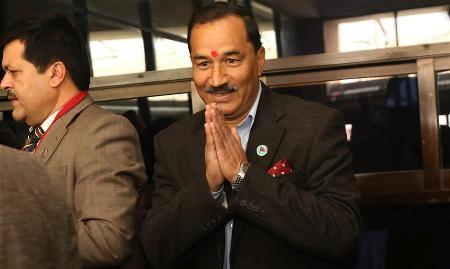 KATHMANDU, Dec. 23 (Xinhua) — Nepali Deputy Prime Minister Kamal Thapa said Wednesday that China’s Belt and Road initiative will contribute to enhancing better economic cooperation among China, India and Nepal.
KATHMANDU, Dec. 23 (Xinhua) — Nepali Deputy Prime Minister Kamal Thapa said Wednesday that China’s Belt and Road initiative will contribute to enhancing better economic cooperation among China, India and Nepal.
Thapa, who is also in-charge of foreign affairs and is embarking on a six-day visit to China from Thursday, said in an exclusive interview with Xinhua that the Himalayan country seeks to serve as the bridge between China and India.
“China has already been the world’s second economic power while India is also a rising economic power. If Nepal acts as a bridge between the two neighbors in the future, this will not only be beneficial to our economic development, but also equally practical to enhancing economic relations between India and China through Nepal.”
The revival of the Silk Road Economic Belt initiated by China will be very important for enhancing cooperation among the three countries, the deputy prime minister said.
Thapa saw many possibilities toward expanding connectivity between China and India through Nepal.
“There are so many possibilities linking three countries through road and railway connectivity. Such as the Qinghai-Tibet Railway network which has now been expanded to Shigatse of the Tibet Autonomous Region of China can be expanded to Kathmandu via Kerung. And the railway can be expanded to the Southern plains of Nepal in the near future. I will discuss all these issues with the Chinese leadership during my visit.”
Nepal signed an agreement with China in December last year to become a part of the Silk Road Economic Belt initiative. Thapa said that his visit will be focused on expanding long-term economic cooperation and connectivity with China by strengthening trade and transit relationship between the two countries.
“I will talk to the Chinese leadership regarding the possibilities of signing the trade and transit treaties. Nepal wants to diversify its trade and commerce in the days to come,” the minister said.
Noting that his country has entered a new era by promulgating a new Constitution in September, the minister said “Nepal now wants more cooperation from China among other friendly neighbours to achieve economic and development goals in the next decades.”
While praising China’s incessant support for Nepal’s socio-economic development, the minister noted that China has been Nepal’s sincere development partner for decades.
“As we are moving for a new era of economic development, we would like to explore and create a broader framework for further enhancement of development cooperation with China. I will try my best during this visit to further strengthen and take the Nepal-china relations to a greater height.”
Leading a nine-member high-level delegation comprising Law Minister Agni Kharel and other senior government officials, the deputy prime minister left for Beijing on Wednesday afternoon.
During his stay in Beijing, the minister will hold bilateral talks with Chinese Foreign Minister Wang Yi, according to Nepal’s Ministry of Foreign Affairs Spokesperson Tara Prasad Pokharel. Similarly, the delegation is also likely to call on senior leaders of the Chinese Communist Party.
Thapa’s visit comes as this year marks the 60th anniversary of the diplomatic relations between the two countries.
This is also the first high-level visit from the Nepali government to China after Khadga Prasad Sharma Oli was elected as the country’s prime minister in October this year.

